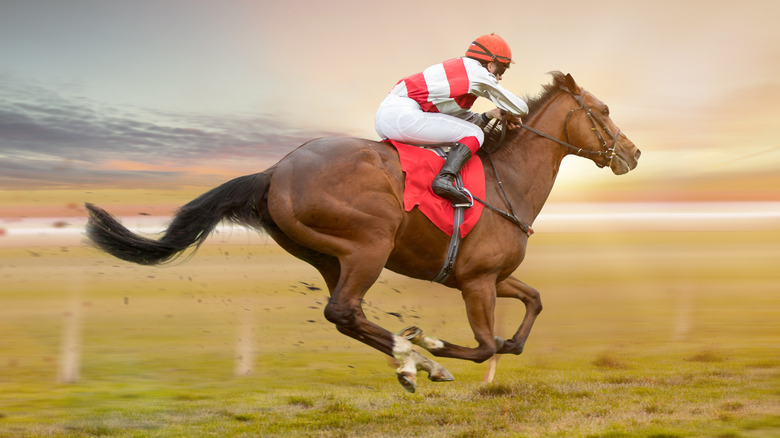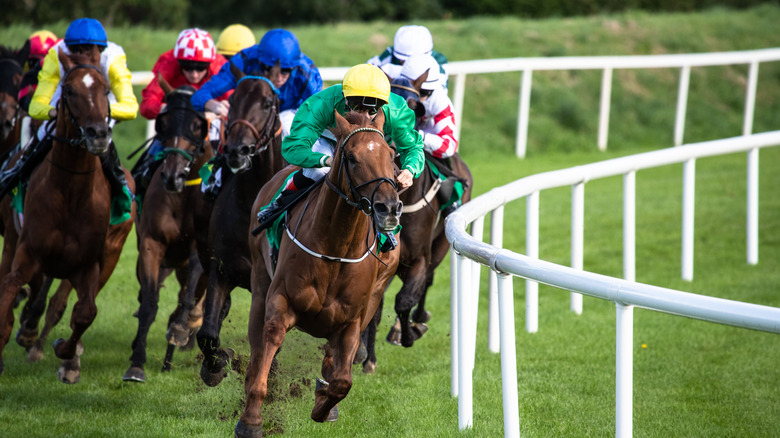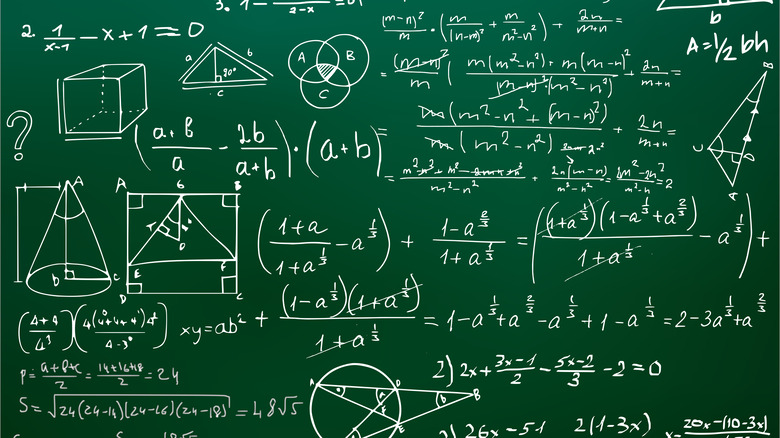The True Story Of An American Gambler That Unlocked The Secret To Winning At The Racetrack
There's an old saying in the gambling industry: "the house always wins." That's because institutions that offer opportunities to gamble — be they billion-dollar Las Vegas casinos or your favorite bookie on the street corner — structure their bets and payouts in such a way that, whatever happens, they'll get a cut of the money. If they didn't, they'd be out of business.
This is especially true in horse racing because the sport relies on a betting system known as pari-mutuel betting. According to Gambling Sites, that means that bettors are not betting against the casino itself, as in blackjack or roulette, but against other bettors; the house merely takes a cut. So you could win day and night at the track, and the track's managers aren't going to care at all since "the house," in this case, is still getting its cut.
By the mid-2010s, an American businessman and his partners had done the impossible: they'd figured out how to beat horse betting. And although they made millions (if not billions), the house still won — because the men were taking money not from the "house" but from other bettors.
Why betting on horses is a losing proposition
We've been racing horses since before recorded history, and we've probably been betting on the outcome of those races for just as long (via Britannica). On the surface, betting on a horse race seems trivially simple: one of six (or eight, or 10, or 20, or whatever) horses is going to win. Learn enough about the horses who are competing, and you should be able to easily predict who will win, right? Not so fast: There are multiple variables to consider, including the horse's placement at the starting gate (those closer to the rail will run a shorter distance and, thus, have an advantage, theoretically), how dry or wet the racing surface is, whether it's grass or dirt, how far the race is (your favorite horse may not be so good at running longer distances), and a host of other factors. Further still, horses are animals with moods, and your pick may not be in the mood to run its best race when you need it to.
All of these variables mean that picking the outcome of a horse race can be difficult. And when you place "exotic" bets — the winners of multiple races, for example, or the first three finishers in one race — the number of outcomes gets even bigger. That's why horse racing can be lucrative — for bettors who know what they're doing. But there are so many variables that few bettors can pick the right horses consistently and profitably.
Or at least until computers came along.
The variables in sports betting
If you're going to be a professional gambler, then sports betting is the way to go (and here, "sports betting" also includes horse racing). That's because other games on which you can wager — roulette, keno, the slots — are all based on random chance. No amount of studying you'll ever do can predict which keno ball will be drawn next or which roulette number the ball will land on.
In sports, however, it is possible — at least theoretically — to make an informed prediction. You can know the players' statistics, how they do in the environment in which they're playing (say, on astroturf in a domed stadium or outside in the cold, on the grass), and so on and so forth, to possibly have an edge against other bettors. The problem is that this requires an exhaustive knowledge of all of the players playing that day, all of the variables that could otherwise affect the outcome of the game, and how to calculate what all of this knowledge means. A couple of generations ago, it would have required an encyclopedic memory as well as enough mathematical prowess to figure it all out on pencil and paper.
But what if a computer could do it for you?
Bill Benter, genius
There is, in fact, a foolproof way to beat a casino at its own game, and it's been around since the 1960s: card counting. Specifically, in blackjack, you keep track of the cards that have been dealt mentally and bet more when the "count" indicates that you're more likely to win. According to the DeCastroverde Law Group, it's perfectly legal (if you do it without the aid of an electronic device, that is), although if you get caught doing it, the casino can and will ban you.
Bill Benter was the type of guy who could count cards in his sleep, so skilled was he at math (via Bloomberg). And indeed, for a while in the late 1970s and early 1980s, Benter took the Vegas casinos for ... well, not much, actually. On a good night, he'd make $40, which was decent money at the time, but not millions. A few years later, however, he upped his card-counting game by joining teams working together and was soon making bank — that is, until he got caught and was banned from every casino in Sin City.
However, Benter had several things going for him, not the least of which was his powerful intellect. He also figured that there had to be a way to beat horse racing through math, and he set off to figure it out.
An obscure academic paper changes everything
Now banned from the casinos, Bill Benter turned his attention toward horse racing and how to beat it (per Bloomberg). Scouring the libraries and bookstores around Vegas, he hit upon several tomes purporting to teach the reader how to beat the track; none of them worked. Benter intuited that there had to be a way to mathematically identify and calculate all of the variables that go into racing horses. Eventually, he found an academic paper that described that very thing: "Searching for Positive Returns at the Track: A Multinomial Logit Model for Handicapping Horse Races" posits that there are factors in a horse race that can be given a mathematical value and inputted into equations to accurately predict the outcome. The authors themselves were more interested in the math of it all than whether or not it could make money ("There appears to be room for some optimism," they noted).
Benter, however, was about that money. Not only was he a genius at math, but he also knew how to program computers, and soon enough, he'd created an algorithm based on the paper's work. By 1985, he had a working program and a plane ticket to Hong Kong, where horse racing is considerably bigger than it is here in the U.S.
Benter made hundreds of millions
In his first year of using the program he'd developed, Bill Benter and his team promptly lost $120,000 of their $150,000 budget, according to Bloomberg. Undeterred, Benter rebooted. He came up with some more seed money, cultivated contacts in Hong Kong who could provide him with even more information, and refined his computer program and what he was putting into it. One year he won about $3 million; in another, he lost money.
Eventually, however, his algorithm was a can't-lose proposition, though by this time, the track was on to him and trying to keep his and other syndicates out of the action, resulting in more work for Benter. By this time, he'd made hundreds of millions and was ready to call it quits. Indeed, he didn't even claim one of his biggest wins — about $13 million on a bet involving picking the top three finishers in each of three races — and the money, by law, went into a charitable trust.
Benter eventually gave up on horse racing in Hong Kong — he'd beaten it and didn't need the money, and instead returned to the U.S. He still bets on the horses from time to time and still wins, but these days, he prefers to focus on his medical transcription business.





